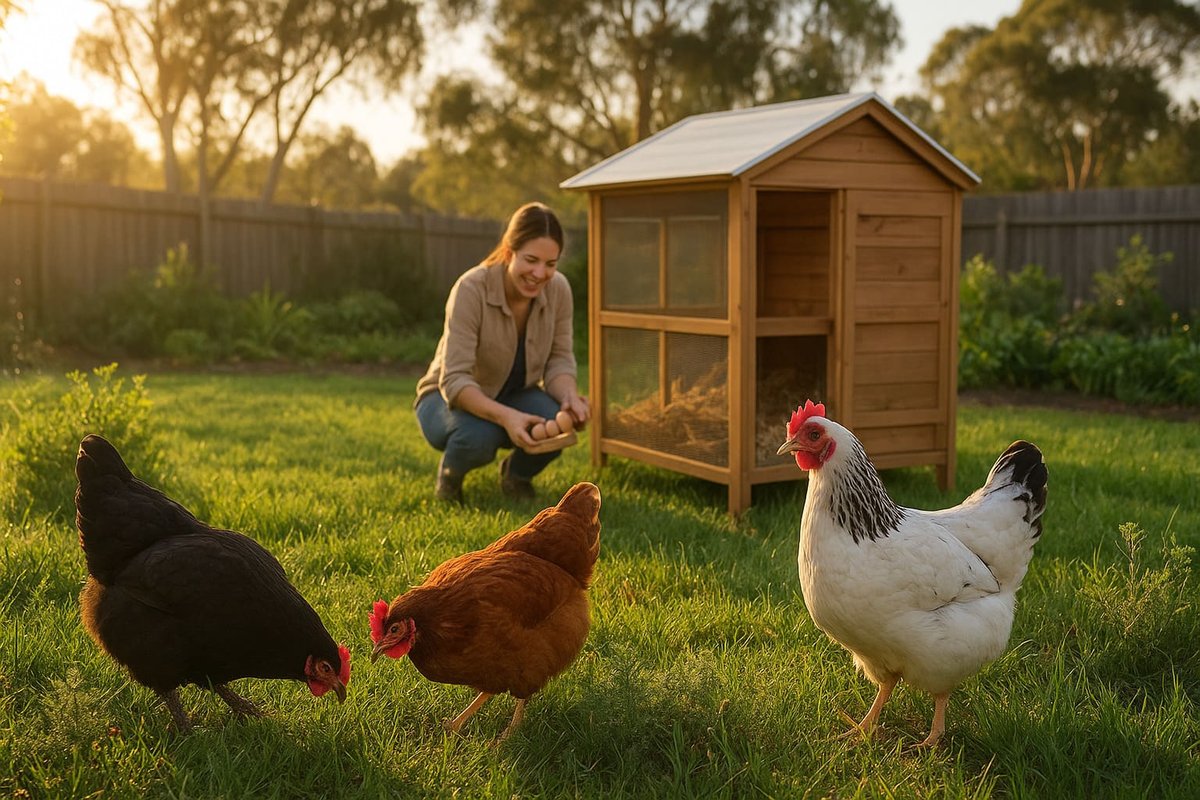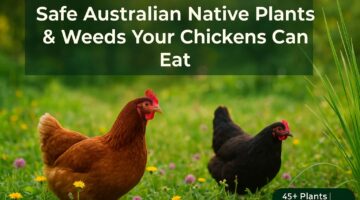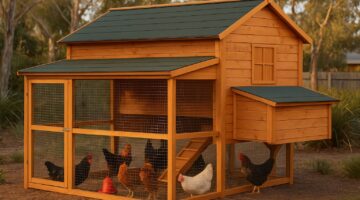The best places to buy chickens in Australia are from specialized, vaccinated suppliers. Your main options are commercial hatcheries (like Specialised Breeders Australia), heritage breeders (like Libby’s Heritage Chickens or Evans Chickens), and educational farms (like Talking Hens). Always ask for vaccination records, especially for Marek’s Disease.
So, you’re ready to join the thousands of Aussies discovering the joy of backyard chickens. You’ve got the coop plans, you’ve checked the council rules, and now you’re asking the most important question: “Where do I actually buy the chickens?”
Finding the right supplier is the single most important step you will take. It’s the difference between a flock of healthy, happy egg-layers… and a backyard full of heartbreak, disease, and unexpected roosters.
This guide is for you. We’ll show you exactly what to look for, the right questions to ask, the red flags to avoid, and a list of verified, reputable suppliers in Australia. We’ve focused on 6 top-tier suppliers to get you started, plus all the info you need to find more in your local area.
The Australian Poultry Scene: A Quick Look
First, let’s get one thing straight. The massive $10.9 billion poultry industry in Australia? That’s not for you.
When you read about “major players” like Inghams Group and Baiada Poultry, they are in the commercial meat business. They don’t sell to backyard keepers. The same goes for the Australian Bureau of Statistics data on chicken meat; it’s a different world.
You are looking for a completely separate, smaller-scale industry of heritage breeders, commercial egg-layer hatcheries (for breeds like ISA Browns), and local farm suppliers. With Australians eating around 50kg of chicken per person annually, the backyard egg-layer has become a beloved part of the food landscape.
What to Look for in a Reputable Chicken Supplier
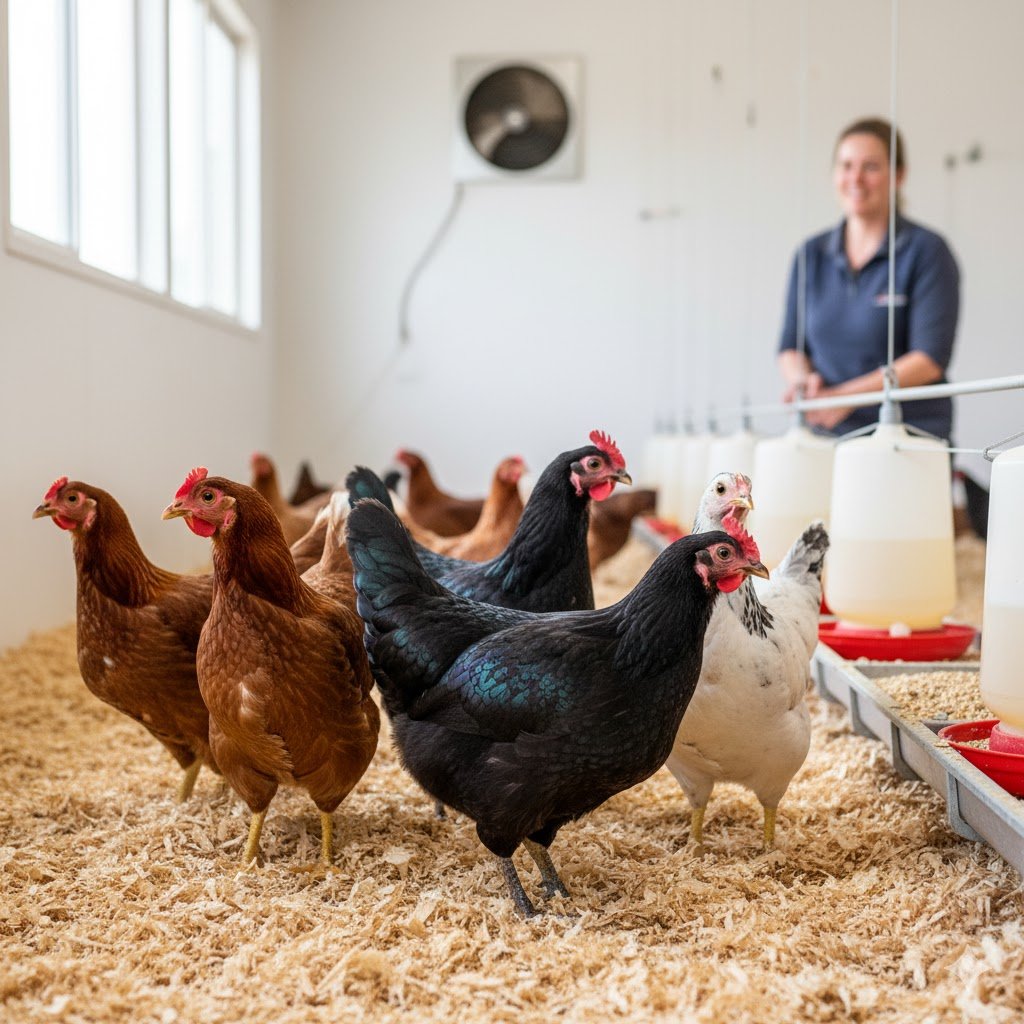
This is your non-negotiable checklist. Before you even think about price, make sure a supplier ticks these boxes.
Quality and Health Guarantees
- Vaccination Records: This is the big one. Ask: “Are your chicks vaccinated for Marek’s Disease?” If the answer is “no,” “don’t know,” or “they don’t need it,” hang up and walk away.
- Health Guarantee: Do they offer a 48-hour health guarantee? Reputable suppliers will replace a bird that unexpectedly dies within a day or two of you getting it home (as this usually indicates a pre-existing issue).
- Sexing Accuracy: Day-old chicks are notoriously hard to sex (tell girls from boys). Ask for their “sexing accuracy rate.” A good supplier will be 90-95% accurate and, crucially, will have a clear “rooster return policy.” This means they will take back any “pullets” that start crowing at 5 AM.
A Special Note: Marek’s Disease Vaccination in Australia
Marek’s Disease is a highly contagious, fatal virus that causes paralysis and tumours in chickens. It’s everywhere in the soil and environment. There is no cure, only prevention.
The vaccine is a “live” vaccine given to chicks at day one of hatching. It is not something you can give to an older bird. This is why you must buy from a supplier who vaccinates at the hatchery. A chick from a Gumtree seller whose “hen just hatched a few” will not be vaccinated, and this is a massive gamble.
Real Biosecurity (Not Just a Buzzword)
Biosecurity is about preventing disease. When you visit a supplier, what do you see?
- Do they have footbaths for you to step in?
- Do they ask you not to wander around or touch birds?
- Are the pens clean, uncrowded, and well-maintained?
- Do they quarantine new birds before adding them to their flock?
A breeder who is casual about biosecurity is a breeder whose birds you don’t want. For comprehensive biosecurity practices, you can read more here, but a good supplier will be on top of this.
Australia’s Biosecurity: What You Need to Know
This isn’t just about clean coops; it’s a national issue.
- Newcastle Disease: Australia has had outbreaks, particularly in NSW. This led to strict biosecurity zones and culling. Reputable breeders are registered with their state departments and are part of the solution.
- Avian Influenza (Bird Flu): While less common in backyard flocks, the government (via Department of Agriculture, Fisheries and Forestry) runs constant monitoring. Good breeders keep their flocks away from wild birds (especially ducks) to prevent any chance of transmission.
- State Departments: Your state’s Department of Primary Industries (NSW DPI, Agriculture Victoria, QLD DAF) sets the rules. A good supplier knows and follows them.
Customer Support and Education
A great supplier doesn’t just sell you a bird; they sell you their expertise.
- Do they ask you questions? (About your coop, your other chickens, your experience?)
- Are they happy to answer your “dumb” questions?
- Do they provide a care sheet or website with info?
- What feed do they recommend, and why? This is a great test question. Once you’ve chosen your birds, you’ll need quality feed—check our review of Australian poultry feed brands to find the best options for your flock.
A breeder who cares about their birds will want to make sure you’re a good home for them.
Our Top 6 Verified Suppliers in Australia
Here are 6 reputable, well-regarded suppliers in Australia. This list is a great starting point, but always call ahead to check stock, opening hours, and policies.
New South Wales (NSW)
1. Evans Chickens
- Location: Maraylya, Northwest Sydney
- Established: 20+ years
- Specialty: Wide variety of heritage breeds and hybrids.
- Breeds Available: Australorp, ISA Brown, Light Sussex, Plymouth Rock, Rhode Island Red, Wyandotte, Pekins, Silkies, and more.
- Price Range: $12 (day-old) to $65 (point-of-lay).
- Unique Features: One of Sydney’s largest and most established one-stop shops. They have a hatchery and breed many birds themselves.
- Opening Hours: Mon 8am-5pm, Fri 8am-6pm, Sat 8am-2pm. (Closed Tues/Wed/Thurs/Sun).
- Contact: Phone recommended; website available for info.
- Customer Reputation: Known as a reliable, large-scale supplier for backyarders.
2. Libby’s Heritage Chickens
- Location: Pheasants Nest, Wollondilly Shire (near Picton)
- Established: 20+ years
- Specialty: High-quality, purebred heritage poultry.
- Breeds Available: Specialises in heritage breeds like Sussex, Orpingtons, Wyandottes, and Plymouth Rocks.
- Price Range: Contact for current pricing.
- Unique Features: Famous for their “rooster return” policy. A family-owned business with a passion for breed standards.
- Opening Hours: Tuesday-Friday (9am-4pm) and Sundays (9am-4pm). Strictly by appointment only. Closed Mondays & Saturdays.
- Contact: Phone or email for appointments.
- Customer Reputation: Highly respected in the heritage poultry community for quality and service.
3. Specialised Breeders Australia (SBA)
- Location: Main hatchery in Victoria, but distributes nationally.
- Established: 20+ years
- Specialty: Commercial-grade, vaccinated layer hens for serious production.
- Breeds Available: Hy-Line Brown and Lohmann Brown.
- Price Range: Bulk/commercial pricing; contact for details.
- Unique Features: This is where many smaller farms buy their stock. They are a massive, professional hatchery. The best source if you want 10+ birds for consistent, large eggs.
- Opening Hours: N/A (Contact for distribution).
- Contact: Website and phone.
- Customer Reputation: The industry standard for commercial layers.
Victoria (VIC)
4. Talking Hens
- Location: Merricks, Mornington Peninsula
- Established: 12+ years
- Specialty: Education-focused supplier of vaccinated, friendly backyard chickens.
- Breeds Available: ISA Brown, Australorp, Light Sussex.
- Price Range: Approx $40 (point-of-lay).
- Unique Features: 1000+ five-star reviews. Focuses heavily on education, workshops, and high-quality coops/supplies. An excellent starting point for beginners.
- Opening Hours: Check website; appointments often needed.
- Contact: Website and phone.
- Customer Reputation: Fantastic. Widely regarded as one of the best, most supportive places for beginners to start.
5. Abundant Layers
- Location: Nar Nar Goon, VIC
- Established: N/A
- Specialty: Vaccinated point-of-lay ISA Browns.
- Breeds Available: ISA Brown, some heritage breeds.
- Price Range: Contact for pricing.
- Unique Features: Offers local pickup and has a strong focus on vaccinated, ready-to-lay pullets.
- Opening Hours: By appointment.
- Contact: Phone or Facebook.
- Customer Reputation: Strong local reputation. An example testimonial: “Local customer Sarah from Bendigo reports: ‘We bought 4 ISA Browns from Abundant Layers. All four started laying within 2 weeks, exactly as promised. Three years later, they’re still going strong.'”
Queensland (QLD)
6. Bonds Backyard Layers
- Location: Gatton, Lockyer Valley (west of Brisbane)
- Established: N/A
- Specialty: Point-of-lay ISA Brown and Australorp-cross chickens.
- Breeds Available: ISA Brown, Black Australorp-Cross.
- Price Range: Approx $40 (point-of-lay).
- Unique Features: Vaccinated, wormed, and “6-week-guaranteed” point-of-lay pullets. They are a well-known supplier for South-East QLD.
- Opening Hours: By appointment (often Saturday mornings).
- Contact: Phone or Facebook.
- Customer Reputation: A go-to for SEQ residents looking for reliable, vaccinated laying hens.
What About Other States? (SA, WA, TAS)
While this list covers the “big 6,” you can find excellent local breeders in every state by applying the checklist from Section 2. A great place to start is your state’s agricultural department, local poultry clubs, or even a local produce store (they always know who the good local breeders are).
Buying Online vs. In-Person
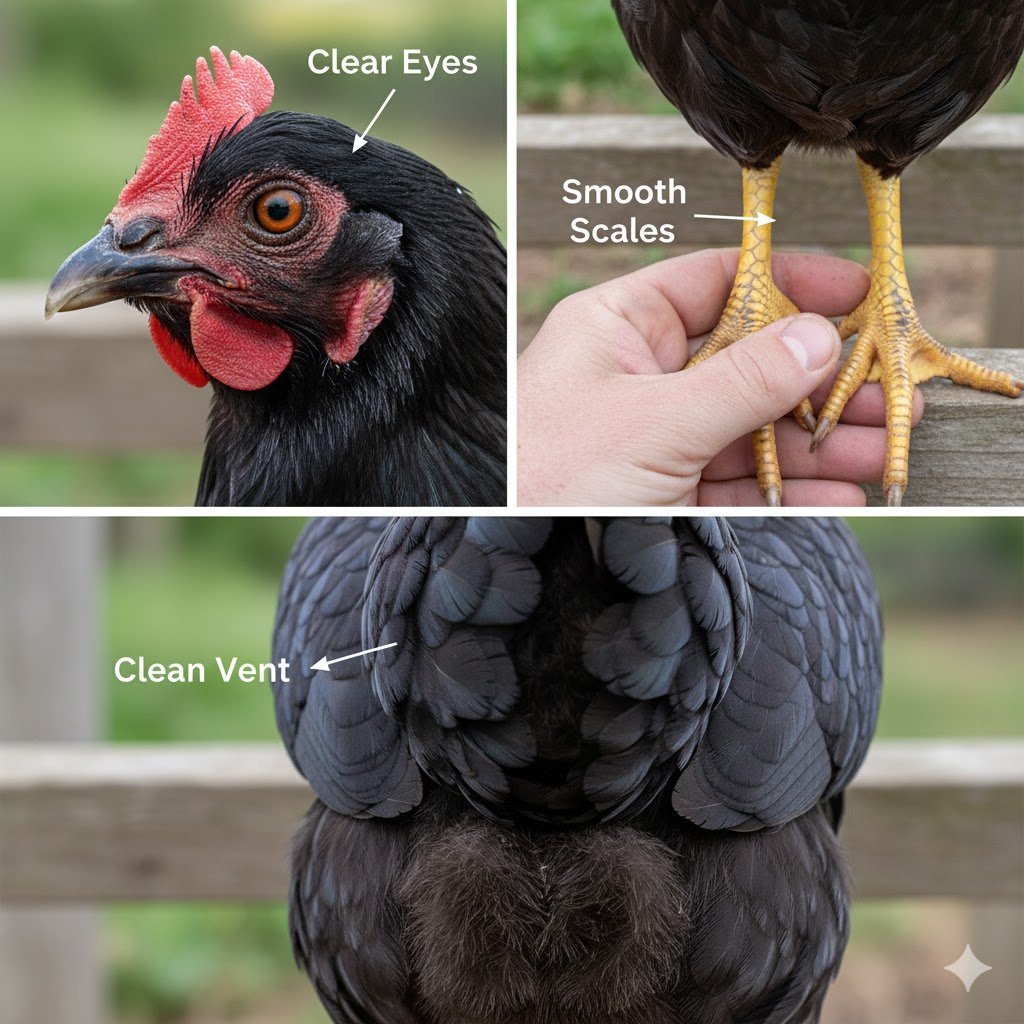
Buying In-Person (The Best Way)
This is always the top choice. You get to:
- See the conditions: Are the pens clean? Do the birds look healthy?
- Meet the breeder: Ask all the questions from our checklist.
- Pick your bird: Look for a bird that is bright, alert, and active.
Buying Online (The ‘Day-Old’ Option)
You can “buy chickens online Australia,” but this almost always means getting a box of day-old chicks shipped to you.
- How it works: Hatcheries like Specialised Breeders Australia can ship chicks via approved couriers. The chicks can survive for up to 72 hours on the yolk they absorbed before hatching.
- The Catch: You must be home to accept the delivery, and your ‘brooder’ (the heated box) must be set up and at the perfect temperature before they arrive. Get our complete checklist of 15 must-haves for bringing chicks home to ensure you’re fully prepared. This is not for beginners.
Breed Recommendations for Australian Backyards
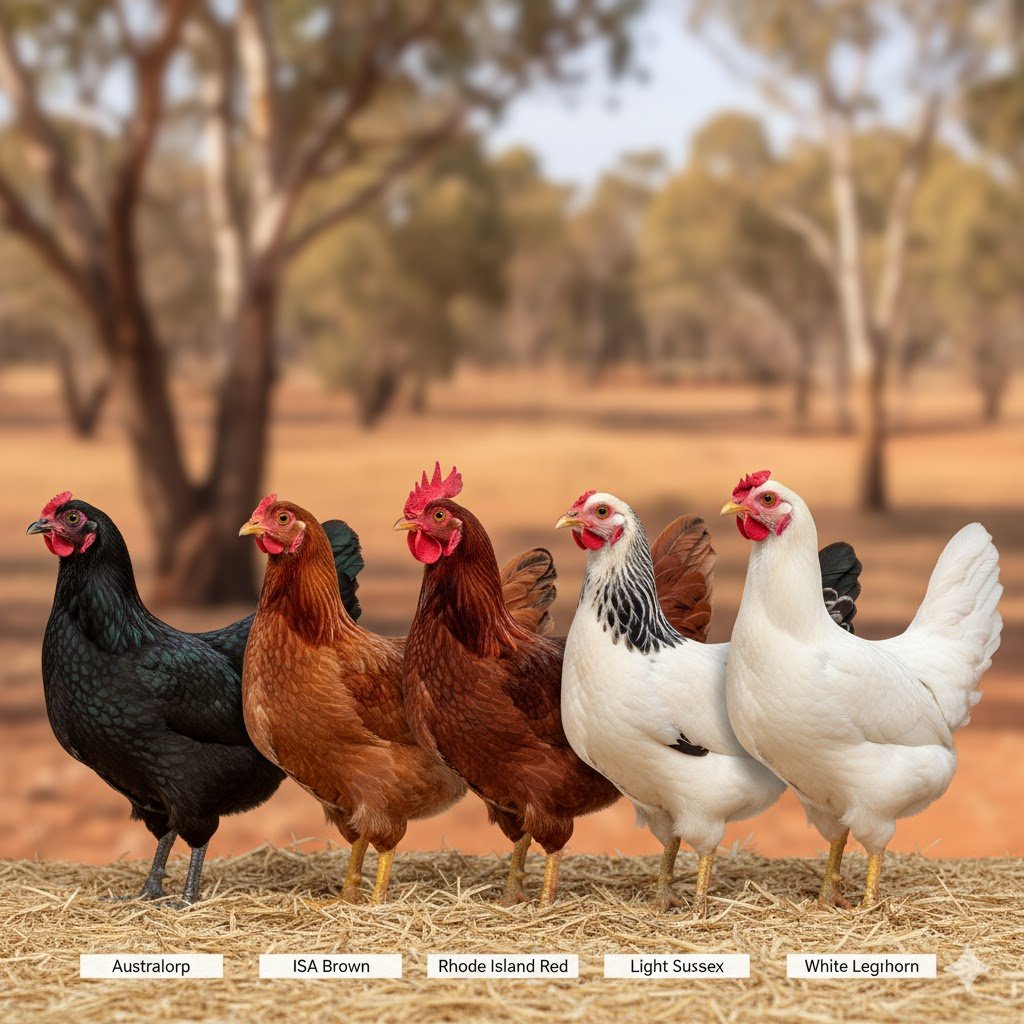
Choosing the right breed for your climate and needs is key.
Did You Know? The Australorp breed, developed in Australia, holds the world record for egg production. One hen laid 364 eggs in 365 days back in 1922.
When choosing breeds for Australian conditions, heat tolerance is crucial, especially in Queensland and northern NSW. Our guide to the 10 best heat-tolerant chicken breeds provides detailed comparisons for hot climates.
The ‘Big 3’ Backyard Breeds
- ISA Brown (The Layer Machine): A modern hybrid, not a “breed.” The friendliest, most reliable egg-layer you can buy. Lays 300+ brown eggs a year. They are the definition of a “pet that makes you breakfast.” Their main downside? They only lay consistently for 2-3 years.
- Australorp (The Aussie Icon): A true heritage breed developed in Australia. They are calm, gentle, and great with kids. They lay 250+ light brown eggs a year and will lay for 5+ years. They can get “broody” (want to sit on eggs). Learn everything about Australorps in our complete breed guide, including their egg-laying records and care requirements.
- Sussex (The Gentle Giant): A beautiful heritage breed (usually white with black neck feathers). Calm, curious, and a reliable layer of 250+ light-coloured eggs. Another fantastic, all-rounder for families.
Best Chicken Breeds for Hot Climates (QLD, NT, WA)
Heat is a bigger killer of chickens than cold. If you live up north, prioritize heat-tolerant breeds.
- Leghorns: These small, active birds are egg-laying champions (300+ white eggs) and handle heat extremely well. They can be flighty and nervous, not cuddly.
- Australorps: Their black feathers can attract heat, but their Australian heritage means they are surprisingly tough and adaptable.
- Naked Necks: They look… strange. But with less-dense feathers and a bare neck, they are built for heat. Good layers and very tough.
A Quick Comparison
| Breed | Egg Production | Temperament | Best For… |
|---|---|---|---|
| ISA Brown | Excellent (300+) | Very Friendly, Cuddly | Beginners, Kids, Eggs Now! |
| Australorp | Great (250+) | Calm, Gentle | Families, Heritage, Dual-Purpose |
| Light Sussex | Great (250+) | Calm, Curious | Families, Pretty Flocks |
| Rhode Island Red | Very Good (250+) | Active, Bossy | Free-Range, Experienced Keepers |
| Wyandotte | Good (200+) | Calm, Good | Pretty Flocks, Cold Climates |
| Silkie | Fair (120+) | Very Docile, Broody | Pets, Kids, Hatching Eggs |
Cost Guide for Buying Chickens in Australia
The price of the chicken is the cheap part. The setup is where the real cost is.
The Chicken Itself
- Day-Old Chicks (Vaccinated, Sexed): $10 – $20 each.
- Point-of-Lay Pullets (16-20 weeks): $40 – $65 each. This is the sweet spot for beginners.
- Rare Heritage Breeds (Show Quality): $80 – $150+ per bird.
The ‘Hidden’ Start-Up Costs
- The Coop: $250 – $800+. Don’t buy a cheap, flimsy one online. It won’t last one season and isn’t predator-proof. For Australian conditions, explore our guide to chicken coop designs for hot climates, which emphasizes ventilation and shade.
- Feeder & Waterer: $50 – $100 for a good set.
- Feed (20kg bag): $25 – $40.
- Bedding (Hemp or Pine Shavings): $30 per bag.
- Total Setup Cost: Expect to spend $400 – $1000 before your first chicken even arrives.
For a complete breakdown of all startup expenses, read our detailed guide on the total cost of starting with chickens in Australia.
First-Time Buyer Checklist
You’re about to make the call. Run through this list first.
Step 1: Check Your Council Rules. Seriously.
This is the most common mistake. Don’t assume you can have chickens. Before getting started with backyard chickens, check your local council website and review our comprehensive guide to Australian council regulations. This is what they’ll almost certainly say:
- No Roosters. Ever. Your neighbours will hate you, and the council will fine you.
- Number of Hens: Most councils limit you to 5-10 hens.
- Coop Setbacks: The coop must be 1m, 3m, or even 5m from your fence line and dwelling. This rule alone makes it impossible for many small yards.
Real-World Council Examples:
- Brisbane City Council: You can keep up to 6 chickens without a permit (on lots over 800m²). The coop must be 1m from fences.
- City of Sydney: You can keep up to 10 chickens. Roosters are banned.
- Melbourne (City of Casey): You can keep up to 5 chickens. Roosters are banned.
Step 2: Predator-Proofing. This is Not a Drill.
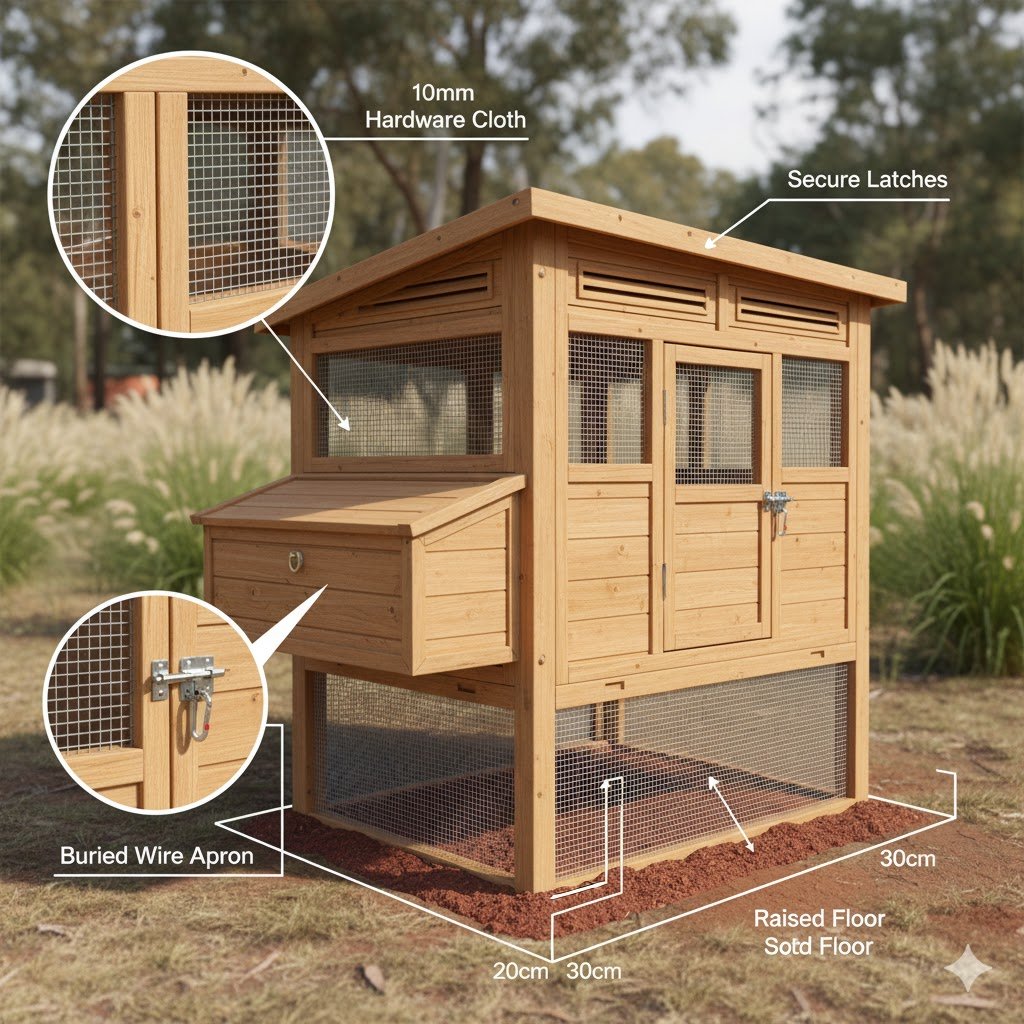
Your second biggest mistake is underestimating Australian predators.
- Foxes dig. Your coop needs a solid floor, or you must dig wire mesh 30cm down and 30cm out around the entire base.
- Snakes get through tiny holes. Any gap bigger than 10mm is a doorway.
- Rule #1: ‘Chicken wire’ keeps chickens in. 10mm hardware cloth (heavy steel mesh) keeps predators out. Use it on all windows and vents.
Our comprehensive guide to protecting your flock from Australian predators covers foxes, snakes, goannas, and birds of prey. If snakes are a concern in your area, explore our snake-proof chicken coop designs specifically for Australian conditions.
Step 3: Your Questions for the Breeder
Have this list ready when you call:
- Are your chicks vaccinated for Marek’s Disease?
- What is your sexing accuracy?
- What is your rooster return policy?
- What age are these birds, and are they point-of-lay?
- What feed are they on right now? (Buy a small bag of the same stuff to transition them slowly).
- Can I see your biosecurity setup? (For in-person visits).
Best Times to Buy Chickens in Australia
Yes, there’s a season for it!
- Spring (Sep – Nov): Peak Season. This is the best time. The weather is mild, and suppliers have high stock levels of both chicks and point-of-lay pullets. It’s ideal for beginners, as your new birds will mature in pleasant weather.
- Autumn (Mar – May): Second Best. Similar to spring, the weather is mild, and suppliers still have good stock. A great time to get a new flock settled before winter.
- Summer (Dec – Feb): The Hardest Time. Avoid getting day-old chicks shipped—heat stress can be fatal. Older pullets will be okay, but you must have shade and cool water set up from day one. Learn how to keep chickens cool during Australian summers.
- Winter (Jun – Aug): Low Stock. Many breeders slow down. It’s harder to find point-of-lay birds, but it’s a good time to get a coop built and ready for spring.
Common Questions About Buying Chickens
What is the best age to buy chickens?
For beginners, point-of-lay pullets (16-20 weeks) are easiest. You skip the tricky baby stage (called ‘brooding’) which needs heat lamps, and you’ll get your first eggs within a few weeks. Still deciding between day-old chicks and adult hens? Our detailed comparison guide explores the pros, cons, and costs of each option.
How many chickens should I start with?
Start with three. Never get just one—chickens are flock animals and will get lonely and stressed. Two is the bare minimum, but three is the perfect starting number.
Do I need a rooster for hens to lay eggs?
No. Absolutely not. Hens lay eggs regardless. A rooster’s only job is to fertilise the eggs (to make chicks) and be very, very loud.
How do I transport chickens safely?
Use a cat carrier or a sturdy cardboard box with air holes. Put some straw or pine shavings on the bottom. For a 1-2 hour trip, they will be fine. Keep the car cool and park in the shade.
Can I mix different breeds?
Yes. You can mix Australorps, ISA Browns, and Sussex easily. Just be careful mixing sizes. Tiny Silkies can get bullied by big Australorps. Always introduce new birds slowly.
A Note on Gumtree, Facebook Marketplace, and Local Ads
This is where most people look first. And it’s the riskiest. You can find great birds, but you’re more likely to find problems.
If you must use these, you are now the biosecurity officer. You must be brave enough to ask the hard questions from our checklist. If it’s a seller getting rid of an “aggressive” hen, or a person with a box of “surprise” chicks… be very careful.
Answering these questions honestly helps you avoid nasty surprises. And speaking of nasty surprises…
Red Flags and What to Avoid
Be smart and walk away if you see any of these warning signs.
- The ‘Car Park’ Seller: Anyone who wants to meet you in a Bunnings car park. You can’t see the farm, the parents, or the conditions. Huge red flag.
- The “My Hen Was Broody” Seller: This is the Gumtree seller with a cute box of mixed chicks. As we said, this means no vax, no idea of breed, and probably 50% roosters.
- The ‘They’ll Be Right’ Attitude: Ask about Marek’s vaccine. If they say “Oh, they don’t need it,” or “It’s a scam,” or “I’ve never had it”… run.
- Visible Sickness: Any bird with messy bums, wheezing, or watery eyes. If one is sick, they all are (or will be).
- Filthy, Overcrowded Pens: This is a recipe for disease and parasites.
- They Can’t Answer Your Questions: A good breeder wants to talk about chickens. A bad seller just wants your cash.
Avoiding these sellers is the final piece of the puzzle. It all comes down to doing your homework and trusting your gut.
You’re Ready to Find Your Flock!
Okay, let’s wrap it up. That was a lot, but now you’re armed with all the right info.
We’ve covered why a good supplier is the #1 most important step. You’ve got a checklist of smart questions to ask, a list of verified suppliers, and a clear idea of the real costs and breeds.
Getting your first chooks is so exciting. It’s a lot of work to get started, but the reward of collecting that first warm egg from a happy, healthy hen you raised… well, it’s pretty hard to beat.
Before you make that call, double-check the First-Time Buyer Checklist (Section 7) one last time to make sure your coop is actually predator-proof.
Now you know where to buy chickens in Australia from trusted sources, you’re all set to start your amazing backyard flock. Avoid common beginner mistakes by learning from experienced keepers, and remember to check the First-Time Buyer Checklist one last time. Good luck!

Oladepo Babatunde is the founder of ChickenStarter.com. He is a backyard chicken keeper and educator who specializes in helping beginners raise healthy flocks, particularly in warm climates. His expertise comes from years of hands-on experience building coops, treating common chicken ailments, and solving flock management issues. His own happy hens are a testament to his methods, laying 25-30 eggs weekly.
